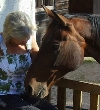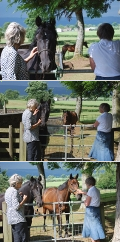
“Horses are emotive animals and people are animated by the sight, sound, touch and smell of horses. They are often regarded as positively mood altering... without any unpleasant side effects!”
Ruth McMahon

“Horses are emotive animals and people are animated by the sight, sound, touch and smell of horses. They are often regarded as positively mood altering... without any unpleasant side effects!”
Ruth McMahon

Equine Assisted Interactions have grown in popularity over the last two decades and many health professionals now work alongside horses in order to help their clients. Being with horses can teach us about relationships and successful communication and getting to know individual horses through a range of activities can help us become more aware of our own processes. Noticing our body language and sensations may also lead to a better understanding of our thoughts, feelings, impulses and behaviours.
For me, connecting closely with my horses has encouraged skills that help me work more effectively with people. I believe learning ‘people skills’ through the lens of horse behaviour can help us explore our stress triggers, together with the meaning behind our instinctual and emotional responses. When you see the same kinds of fearful or sometimes aggressive behaviours in horses that you see in people, it becomes easier not to take human misbehaviour so personally.
 EAT offers an alternative to conventional counselling and psychotherapy, which can be experienced as too intense or threatening. Horses don’t criticise, they are non-judgemental, sensitive, and responsive to intent.
They can detect emotions and usually provide immediate and honest feedback. Most importantly horses don’t lie because they don't separate how they feel from how they act. Hence EAT offers a unique opportunity to explore behavioural issues in a non-confrontational way, encouraging the development of verbal and non-verbal communication skills.
Opportunities for powerful metaphoric learning often arise and as self-awareness develops we ‘grow’ as individuals, finding it easier to change our perception of ‘self’ and of ‘others’.
EAT offers an alternative to conventional counselling and psychotherapy, which can be experienced as too intense or threatening. Horses don’t criticise, they are non-judgemental, sensitive, and responsive to intent.
They can detect emotions and usually provide immediate and honest feedback. Most importantly horses don’t lie because they don't separate how they feel from how they act. Hence EAT offers a unique opportunity to explore behavioural issues in a non-confrontational way, encouraging the development of verbal and non-verbal communication skills.
Opportunities for powerful metaphoric learning often arise and as self-awareness develops we ‘grow’ as individuals, finding it easier to change our perception of ‘self’ and of ‘others’.
Clients who come for counselling often have low self-esteem or lack confidence. They may find relationships and social interaction difficult, or feel anxious and depressed. Being with horses has many healing benefits and Equine Assisted Therapy has something to offer anyone who wants to learn more about themselves and their relationships. Building a successful relationship with a horse relies largely on the development of mutual trust and respect but skills such as concentration, observation and curiosity are also necessary. Therapists may choose activities to encourage these skills, including how to manage and care for a large animal. This can be empowering, helping to improve confidence and self-esteem. Horses also offer comfort and connection through touch and stroking, both of which have been shown to be therapeutic in the treatment of anxiety and depression.
If you are interested in training or workshops on EAT please see my Workshops and Training page.